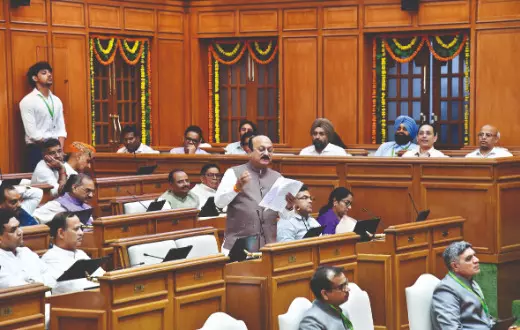Minister Sood introduces Bill to regulate private school fee hikes

new delhi: In what Education Minister Ashish Sood termed a “permanent solution to a long-ignored issue,” the Delhi government on Monday introduced the Delhi School Education (Fee Regulation and Transparency) Bill, 2025 in the Legislative Assembly. The bill, presented by Sood under Chief Minister Rekha Gupta’s leadership, seeks to end arbitrary and unauthorised fee hikes by private unaided schools across the national capital.
Calling the day “a golden day in the history of Delhi’s education system,” Sood said, “Education is not a business, it’s a responsibility. The purpose is not to make profit but to ensure learning and nation-building.” He added that just as the Central government had resolved long-standing issues like the Ram Mandir, Article 370, and rural electrification, the Delhi government was now addressing legacy challenges in the education sector, the most pressing being the “unchecked rise in private school fees.”
Sood strongly criticised previous governments, including the AAP-led regime, claiming they failed to build adequate government school infrastructure and allowed fee exploitation by private schools to continue. “Earlier governments issued token orders just for show while fearing or colluding with the education mafia,” he said. He alleged that no audits were conducted and fee structures were left unregulated for years. He further claimed that the AAP regime constructed only 20 new schools, most of which were approved during earlier administrations.
The bill mandates every private unaided recognized school in Delhi, including minority institutions and those on privately owned land, to submit a proposed fee structure for three academic years in advance. This proposal will be reviewed by a School-Level Fee Regulation Committee constituted by July 15 each year. The committee will comprise five parents selected through a draw of lots, at least two women, and one member from the SC/ST/OBC categories, along with a Directorate of Education (DoE) representative and a school management official as chairperson. Once approved, the fee will remain fixed for three years and must be publicly displayed on notice boards and school websites.
To deter profiteering, fee criteria will be based on staff salaries, infrastructure, and inflation-linked increments, but profit margins are barred. Unauthorised fee hikes will invite penalties between Rs.1 lakh and Rs.10 lakh. Repeated violations may result in doubled fines, cancellation of recognition, or even government takeover. If a student is harassed or removed for non-payment of fees, the school will face a Rs.50,000
fine per student.
If parents disagree with the approved fee structure, they must form an ‘Aggrieved Parents Group’ comprising at least 15 percent of the total number of parents in the school. This group can appeal to the District Fee Appellate Committee, which must deliver a verdict within 45 days. If the appeal is unresolved, it will automatically be referred to a higher Revision Committee headed by an education expert and representatives from both the school and parent community.
Despite being welcomed by some school administrators like Sudha Acharya of ITL Public School, who said, “We will try to take parents on board right from the beginning,” the bill has triggered concern among several parent bodies. Ashok Agarwal of the All India Parents Association said, “Requiring a minimum of 15 percent of parents to challenge a fee hike is nearly impossible. It effectively denies parents the right to contest arbitrary hikes.” Shikha Bhagga, a lawyer and parent activist, questioned the lack of transparency in the selection process of parent representatives and criticised the inclusion of infrastructure as a fee determinant, saying, “Infrastructure is the school’s asset, not the responsibility of students.” Opposition leader Atishi (AAP) called the bill a “deliberate attempt to protect private schools,” alleging that the government delayed the bill to allow fee hikes to take place unchecked. “The biggest concern is that the bill includes no provision to roll back these hikes, effectively legitimising them,” she said.
The 2025 bill follows decades of legal tussles over fee regulation, with past court rulings and DoE orders emphasising transparency. Its success now hinges on judicial scrutiny and effective on-ground implementation.



